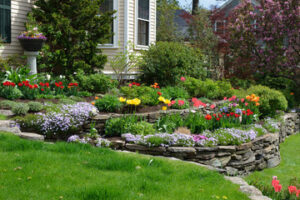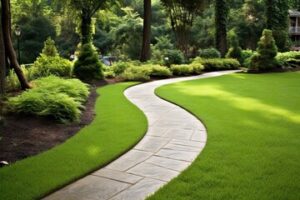A well-designed landscape turns your yard into a living space that enhances and supports your family’s lifestyle. It includes a mix of softscapes, hardscapes and plants that offer beauty and functionality.

Unity is key in Florence Landscaping. Whether it’s repetition of plant species or building materials in pathways, patios and landscape edging, a sense of unity creates continuity.
A pop of color can instantly elevate the look of any landscape. It can add interest to flower beds, trees, and shrubs. It can also be added to hardscape features like water features and outdoor furniture.
Seasonal color programs are popular because they can provide eye-catching curb appeal for a property. They often involve installing spring plants that will bloom throughout the summer and then switching them out for fall plants once they start to wilt. These programs are usually done in high-traffic areas like entrances to the building or common areas.
Word of mouth is one of the best ways to market a landscaping company. Ask clients to write reviews of your services and display these on your website. It’s also a good idea to create a referral program to encourage current customers to spread the word about your business. In fact, HubSpot reports that 55% of consumers learn about businesses through their friends and family. These referrals can make or break a landscaping company’s success. So be sure to thank satisfied clients and offer them incentives to keep the word going.
Form
Form pertains to the shapes and textures of the plants, rocks and hardscape in your landscape. A balanced arrangement of these elements will create a pleasing aesthetic that will reflect your desired style, be it modern, Japanese, English or rustic.
Form is a powerful design element that helps connect people to your landscape. It can be used to define areas, establish flow, create focal points and guide visitors through your property. Form can be created with hardscape materials like pathways, paving stones and lawns or softscape elements like grass, trees and shrubs.
Line is another important design element. It can be created vertically, horizontally or curvilinearly and can help guide the eye through a landscape. Line can also be implied through the use of shapes, sizes and colors in the landscape. For example, the spiky silhouette of a yucca plant can contrast with the rounded shape of a boxwood hedge.
Repetition is a common element in the landscaping process. However, it must be carefully used to avoid monotony and to create a sense of rhythm. The closer the repetitions, the faster the rhythm. For example, grouping a variety of plants (shrubs, conifers, perennials and annuals) into well-defined planting areas rather than scattering them throughout the garden creates a sense of rhythm.
Texture refers to the roughness, smoothness or fineness of a surface. Landscapes should strive to balance coarse, medium and fine texture. For example, a sculptural, coarse-textured plant can be balanced by adding a medium-textured tree or shrub in front of it, and finishing off the composition with a low, fine-textured groundcover.
Plants change their form and texture through the seasons. Incorporating these changes into your landscape design can provide year-round interest and add visual contrast. For example, you could include a pond to add water features or incorporate a flower garden that will change from full bloom to seed heads in the fall.
Texture
Although color is often the focus of landscape design, texture plays an equally important role in enhancing your garden. In fact, it is the primary way you can change a landscape without altering its size or introducing new plants.
Whether it is the roughness of plant foliage, the smoothness of hardscape materials or the fineness of a flower’s petal, textural variety adds depth and dimension to a planting. It also helps to break up a regular pattern of similar textures that can be visually monotonous.
In addition to adding interest, texture can be used to subtly manipulate the perception of a garden’s size. By placing fine textures along the outer perimeter and coarse textures toward the front, you can make a garden feel larger because the delicate details recede into the distance. Conversely, if you want a garden to feel smaller and more intimate, the detail of the coarse textures will draw the eye closer.
Texture can be created through contrasting colors as well as varying the size of plant material. For example, combining the fine, feathery leaves of ornamental grasses or delicate ferns with the bold, sword-like foliage of a plant like yucca or agave provides dramatic contrast.
Texture can also be achieved by introducing different textures in the same planting, such as pairing silver lace dusty miller with coarse-leafed red salvia. However, it is essential that you do not overdo this. Too much of any type of texture appears inharmonious and creates a sense of unrest.
Scent
The sense of smell (or aroma) is an important element to consider when designing your landscape. Fragrant plants add an extra dimension to the experience of your garden, whether it is the heady perfume of a flowering magnolia, the tangy scent of tea olive, or the resinous aroma of ylang-ylang. Night-blooming flowers such as datura and nicotiana release their sweet fragrance at dusk, and fragrant herbs like thyme and chamomile can serve as groundcovers in mixed borders or patio plantings.
Maintenance
A well-maintained landscape enhances curb appeal and increases property value. Professional landscaping firms offer a wide range of services, from design planning to terrain assessment and construction of features like pathways, walls, water features, and patios. They can also address challenges like soil erosion, invasive plant species, and insect infestation with strategies like mulching, pruning, and regular monitoring.
Unlike gardening, which is often focused on personal enjoyment and the growth of food or plants for beauty, landscaping has a broader scope. It combines the aesthetic arrangement of natural elements like lawns, trees, and flowerbeds with structures like fences, paths, and wall structures. Landscapers may create a formal garden with trimmed hedges or a more natural, wilder environment with native plants and flowing streams or ponds.
Landscaping maintenance tasks include lawn mowing and trimming, pruning and edging, weed control treatments, and seasonal plantings. They also focus on ensuring healthy, vibrant plants with proper irrigation and fertilization. They will often conduct soil tests to determine the nutrient content and health, as well as address problems like drainage, compaction, and erosion.
One of the most significant consequences of neglecting HOA landscape maintenance is the decline of property values. A poorly maintained yard sends the message that a home or business isn’t well-cared for, and it can deter potential buyers or tenants.
Proper care of a yard also makes it safer and more enjoyable for residents to spend time outdoors. Dead or dying plants, unkempt trees, and overgrown shrubs can pose safety risks, but they can be easily addressed with prompt, emergency maintenance services. A pristine yard also encourages outdoor activities, from leisurely walks to entertaining friends and family in the sun.
